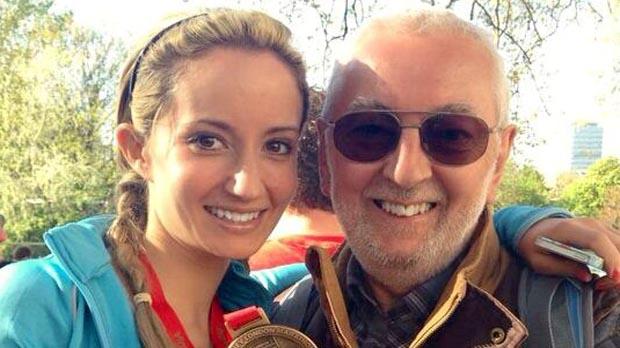
“I think it’s really important that people keep signing up to these type of trials to push research forward.”
Please note - this trial is no longer recruiting patients. We hope to add results when they are available.
This trial is looking at a new drug called ADI-PEG 20 with cisplatin and pemetrexed. It is for people with mesothelioma that started in the lining of the lungs (pleura) and that can’t be cured by surgery.
Mesothelioma can start in the lining of the lungs or the tummy (abdomen). Pleural mesothelioma is when it starts in the lining of the lungs.
Some people with pleural mesothelioma have surgery. But surgery is not possible for many people with mesothelioma because their cancer has grown too far. This is advanced cancer.
You usually have treatment with chemotherapy for advanced pleural mesothelioma. Cisplatin and pemetrexed is a standard treatment for pleural mesothelioma.
But doctors are looking at new ways to help people with advanced mesothelioma. In this trial, they are looking at a new drug called ADI-PEG 20.
Researchers have found a new way of destroying cancer cells, by removing a substance called arginine. Arginine helps with different jobs in the body, including cell growth. Doctors think that if you remove arginine, cancer cells will not be able to replace it. And this might stop the cancer cells from growing.
Doctors know from laboratory studies and other clinical trials, that ADI-PEG 20 can remove arginine from cells.
Everyone taking part in this study has 1 of the following:
 ) with pemetrexed and cisplatin
) with pemetrexed and cisplatin The main aim of this trial is to find out how well ADI-PEG 20 with pemetrexed and cisplatin works for people with advanced mesothelioma.
The following bullet points list the entry conditions for this trial. Talk to your doctor or the trial team if you are unsure about any of these. They will be able to advise you.
Who can take part
You may be able to join this trial if all of the following apply. You:
 called ASS1
called ASS1Who can’t take part
You cannot join this trial if any of these apply.
Cancer related
You:
 and this is causing you symptoms
and this is causing you symptoms  of the cervix, basal or squamous cell skin cancer or any other cancer that have been successfully treated
of the cervix, basal or squamous cell skin cancer or any other cancer that have been successfully treatedMedical conditions
You:
Other
You:
This is an international phase 2/3 trial. The researchers hope that around 386 people worldwide will take part.
This trial is randomised. Everyone is put into 1 of the following groups by computer:
Neither you nor your doctor are able to decide which group you are in.

You have ADI-PEG 20 or the dummy drug as an injection into the muscle of your shoulder, buttock or thigh. You have an injection every week.
Everyone has cisplatin and pemetrexed as a drip into a vein, every 3 weeks. It takes about 8 hours each time you have it.
To reduce the side effects of cisplatin and pemetrexed, you take folic acid tablets and vitamin B12 injections. Your doctor can tell you how often you need to have this.
You continue to have treatment for as long as it works and the side effects aren’t too bad. It can be for up to 18 weeks (4 and a half months).
You may be able to continue to have ADI-PEG 20 or the dummy drug after 18 weeks if it’s still helping you. Your doctor can tell you more about this.
Tissue sample
The researchers will ask to use a sample of your cancer taken when you were diagnosed. You need to have a  if there isn’t a suitable sample available.
if there isn’t a suitable sample available.
Doctors want to test for an enzyme called ASS1. They might also use it in future studies to learn more about mesothelioma.
Doctors might also ask you to have a biopsy if your cancer gets worse. You don’t have to agree to this if you don’t want to. You can still take part in this trial.
Blood tests
You have some extra blood tests as part of this trial. Researchers are looking at the effect of ADI-PEG 20 in your body. They may also use the blood samples in future research studies.
You see a doctor and have some tests before taking part. These tests might include:
 )
)During treatment, you see trial team every week. You have a physical examination, blood tests and a heart trace at set times.
You have a CT scan or MRI scan every 6 weeks. This continues for as long as you are having treatment.
When you finish treatment, you see the trial team after a month. You then see or speak with the trial team every 3 months.
The trial team monitor you while you are having treatment. They will give you a phone number to call them if you are worried about anything.
The team will tell you about the possible side effects before the start of treatment.
The common side effects of ADI-PEG 20 are:
We have information about the side effects of pemetrexed and cisplatin.
Please note: In order to join a trial you will need to discuss it with your doctor, unless otherwise specified.
Dr Peter Szlosarek
Polaris Pharmaceuticals Inc
Queen Mary University of London
If you have questions about the trial please contact our cancer information nurses
Freephone 0808 800 4040

“I think it’s really important that people keep signing up to these type of trials to push research forward.”